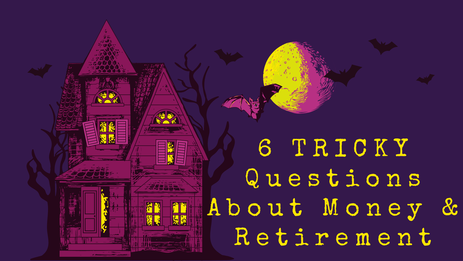|
Retirement can be an exciting time in one’s life. Unfortunately, some find themselves in less than favorable circumstances due to unwise real estate moves. Avoid these mistakes if you are planning a move in your retirement.
5. Have a plan for the proceeds—If you make a nice profit from downsizing, consider what you will do with that extra money. Although purchasing a new car, or taking lavish vacations sound good, investing your proceeds may be just what the doctor ordered to be confident you have the retirement nest egg, you are looking for. Check with the professionals before making your move. Contact Brien L. Smith, CFP® or Sarah D. Buenger, MPAS®, MSPFP, CFP® at 979-694-9100 or visit our website at www.TraditionsWealthAdvisors.com (Kathy Massey 2020 BCSRAOR president)
0 Comments
1. We should have 15% pre-tax in our retirement plan but how much should we save post-tax in our IRA or saving accounts?
There is no single percentage that works for everyone but if you can save 15% in pre- and post-tax you are doing good. Other things to consider are to make sure you are contributing enough to get your employer’s full retirement match if you have a 401(k). Next, I would make sure you have three months worth of an emergency fund. Then I would max out your Roth IRA contribution. Finally, if you have any extra money left, then I would put it in savings. 2. In our volatile market, what is your suggestion for those that are already retired to make their retirement last longer? Make sure you are meeting with your financial advisor to discuss this more in detail. Based on your age, you should be invested correctly to get you through the ups and downs of the market. Also, making sure that your expenses are low is the best way to make sure your retirement lasts. Even getting a part-time job so you don’t have to pull money from savings is another option. 3. My employer is no longer contributing to my 403(b) or 401(k). Should I stop contributing to my 403(b) or 401(k) and move those funds to an IRA instead? The only way to roll over your 403(b) or 401(k) to an IRA is to leave your job or reach the age of 59 ½ (called an in-service distribution). You should keep contributing to your 403(b) or 401(k) even though you are frustrated that your employer is no longer contributing. 4. In January of 2020, I contributed the max of $7,000 to my Roth IRA. Now I won’t have enough earned income to contribute that amount. Is there a penalty? What should I do? You’ll need to withdraw the excess amount plus their earnings, and you’ll want to do so before you file your taxes for 2020 next year to avoid a 6% penalty on the excess contribution. You’ll owe income taxes on the earnings (but not the amount you contributed). If you’re under 59 ½, you may owe a 10% early withdrawal penalty on the earnings, but again, not on your contribution. 5. I make less than $35,000 annually, have little in savings, and am 39 years old. What is the best IRA for me? A Roth IRA is probably best for you. You won’t be able to deduct your contribution when you do your taxes, but all the money you put in there AND all the money you earn will be all yours tax-free when you retire. As far as choosing an account, look for low fees (aim for 0.25% annually or less) and no minimum deposit. 6. Does your IRA contribution affect how much you can contribute to an employer-sponsored account? The $6,000 contribution limit (or $7,000 if you’re 50+) is the total limit for all IRAs that you have. Your IRA contributions don’t affect how much you can save in an employer-sponsored account, like a 401(k). So if you have both a traditional IRA and Roth IRA, you can only contribute $6,000 or $7,000 total between the accounts. If you have a 401(k), you can still contribute up to $19,500 in 2020 (or $25,000 if you’re over 50). For questions or concerns regarding this article, contact Brien L. Smith, CFP® at Traditions Wealth Advisors [email protected] or 979-694-9100. Source: Hartill, Robin. 29 September 2020. https://www.thepennyhoarder.com/retirement/retirement-questions/?aff_id=128&aff_sub3=/retirement/retirement-questions/_20201002_social-organic_Twitter |
Archives
July 2024
Categories
All
|
Let our team work for you. Call 979-694-9100 or
email [email protected]
|
TRADITIONS WEALTH ADVISORS
2700 Earl Rudder Frwy South, Ste. 2600 College Station, TX 77845 |
VISIT OUR BLOG: Stay current with industry news and tips.
|



